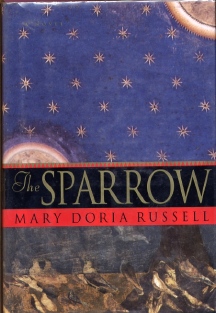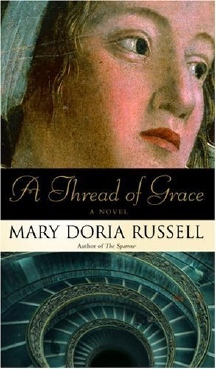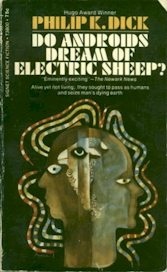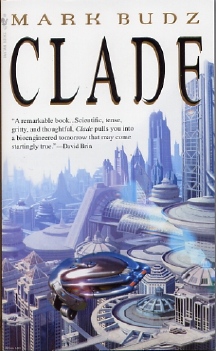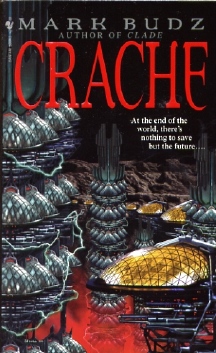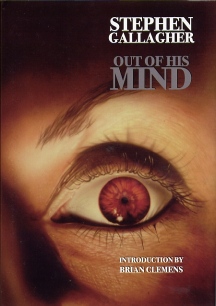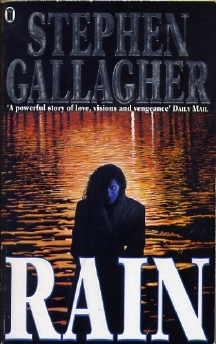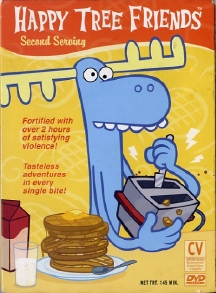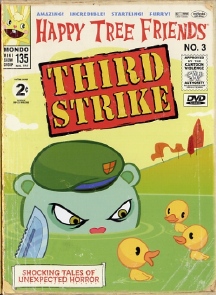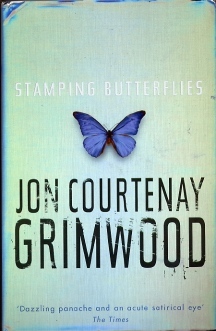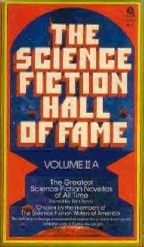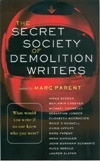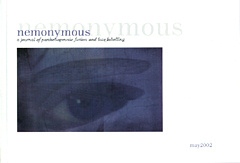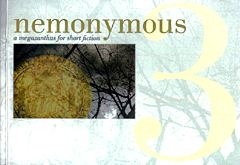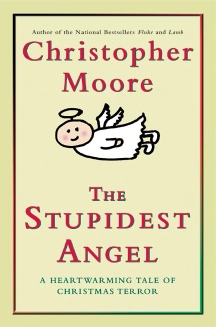|
|
|
This Just In...News from the Agony Column
|
12-10-04: Hanging by 'A Thread of Grace' |
||||||
The
Return of Mary Doria Russell
It begins in 2059, after Emilio Sandoz, a Jesuit priest is released from isolation. He's just returned from the first expedition to another star. The trip has been an unmitigated disaster, and Sandoz has been irredeemably disgraced. The novel then rewinds to 2019, when the first signals from another civilization appear in the datastream of the Arecibo radio telescope. The signals from the planet that will come to be called Rakhat are music, or perhaps they're prayer. While the UN dithers, the Society of Jesuits quietly puts together an expedition that arrives before any other. Sandoz leads the expedition to catastrophe. But he sure as hell learns what it means to be human -- and not human. Russell's novel was powerfully written, focused on the characters and the civilizations. She managed to break out of the science fiction world before properly breaking in. 'The Sparrow', and the follow-up novel 'Children of God', managed to slip by the labelers, escape from the science fiction ghetto, and appeal to a wide audience, much to the consternation of some science fiction readers and critics. These books do elicit strong opinions, because what happens in them is both particularly just, particularly clear and extremely horrible. But this isn't horror for horror's sake. The actions that unfold in 'The Sparrow' are so clearly comprehensible, the mistakes so achingly, awfully understandable that the novels manage to achieve an escape velocity that took them out of the gravitic influence of science fiction and into the realm of just plain literature. Russell demonstrated that it is possible to write science fiction literature. Whether or not anyone likes it -- don't get me wrong, many did -- 'The Sparrow' and 'Children of God' were clearly both literature and science fiction, fully possessed of the vibe of both genres.
One of the things that most distinguished 'The Sparrow' was the moral complexity that Russell managed to portray. Once again, she's created a situation in which it's easily possible to be both right and very, very wrong, to appear strong but fall victim to individual weakness, to be moral but to impose one's morals on those in an entirely amoral fashion. In other words, she's writing about life as we know now, and as we knew it then. Life as it always is. "Messy" they tell us, when people are dying for no reason. Sure, that's one way to put it. Of course some of us like to call a horror story a horror story, no matter what the cause of the horror may be. We're awash in a lot more horror than most of us would prefer to admit. But then, nobody wants to wake up and find out that they’re in a Stephen King novel. And those who do have that wish certainly don't want to find out that they're in 'Schindler's List'. Of course, as I said, I like to call my horror stories as I see them. And that leads me to think I'd be more likely to enjoy 'It's a Horrible Life' this Christmas season. Not a movie they're like to run. You remember the old Rod Serling movie, don't you, it came out for thirty seconds in the early 1960's? You don't? More's the pity. The publishers are hoping that Russell will be able to ride the wake of recent World War Two novels that made it big in the mainstream. 'Captain Correlli's Mandolin' and 'The English Patient' are the two role models they hope to see this novel follow up on, and presumably that means they're hoping for a movie adaptation as well. For the rest of us, it will come down to a page one test, and a pretty difficult question. Can we abandon our genre reading for a non-genre novel by an author who once sort of dabbled in SF with great success? History suggests that Russell is fighting an uphill battle. But on the other hand, it's been a long time and lots of us who felt pretty young back in 1996 no longer feel that way. As the shadows lengthen in our lives, World War Two starts seeming a lot closer. Perhaps uncomfortably so. And so in an effort not to forget, we may find ourselves moved to read. If not to action. |
|
12-09-04: Mark Budz, Philip K. Dick, 'Clade' and 'Crache' |
|||||||||
Paperback
Strategies, Part 2
Nowadays, the mass-market paperback enjoys just a smidge more prestige than back then. Oh sure, it's the medium for all the media tie-ins, both the bane and the boon to the SF&F field. But as I recently pointed out, the MMPB is also a way for new writers to get their work quickly into the hands of lots of readers. I understand this marketing strategy, though personally, I'd prefer to see writers like Liz Williams and today's subject, Mark Budz, get published in lavish hardcovers as well. And this is possible with publishers like Golden Gryphon and Night Shade. The latter is, for example, publishing Tricia Sullivan's 'Maul', a UK paperback original, sometime next year. Liz Williams' work sees hardcover via Pan Macmillan in the UK. So it's possible to have the best of both worlds.
Now I've been meaning to get to 'Clade' for almost a year now. But often I trust my readers and know that they'll find stuff I'm interested in without my direction. Heck, they send me email recommending stuff, which is how I found Karen Traviss. Budz caught my eye from the get-go. For one thing, Bantam Spectra sent Bookshop Santa Cruz a standee, one of those cardboard contraptions meant to display featured novels, and featured it was. But the title, the subject and the setting all cemented my interest. For while Northern California is currently shipping the future out to the rest of the world daily, it doesn't get a lot of play in science fiction novels. Budz goes a long way to correct that in 'Clade'. Starting off in the bio-engineered San Jose "of tomorrow" (that's a pretty hefty tomorrow, if you ask me), the world is past the ecocaust that pretty much wiped out our environment. As we all know, we're hard at work on that now. Get out there in your SUV's folks, we've got an ecocaust to create! Pass the Styrofoam plate, please. Good. Humans are genetically engineered to enforce social hierarchies, once the tech becomes cheaper than the good old economic means currently in vogue. 'Clade' tells the story of Rigo, a young man on his way up. In fact, he's headed out of the Clades, out of the scent-engineered society on earth to help construct a new colony on a comet. Readers can imagine that this big break turns out to be bust and the complications that follow will change Rigo.
That follow-up, 'Crache' (Bantam Spectra / Random House ; November 23, 2004 ; $6.99) is now on the shelves. It's set in the same science-fictional creation, but features an entirely new cast of characters. This time the action starts on the asteroid of Mymercia, where the ecotecture begins to mysteriously decay, killing everyone in a workgroup but Fola Hanani. Back on earth, a migrant worker plays guitar to help restore the souls of his community. It's the start of an infection that could crash humanity itself. Once again, lots of space-based and down-to-earth science fictional weirdness presents itself in an MMPB format. I'm told by those who should know that this novel is even better than 'Clade', and they both sound great to me. After all, my kids may be living in a future not unlike that described by Budz. If only I can manage to toss away enough Styrofoam cups. I'm trying, believe me. |
|
12-08-04: All Hail the Sham of Upper-Crust Schooling |
|||
'Never
Let Me Go' by Kazuo Ishiguro
Titled 'Never Let Me Go', Ishiguro's forthcoming work is set in a pleasant English Boarding School. Since we just packed our oldest child -- now a young man, actually -- off to college, my wife and I are now fully cognizant as to why the English are so fond of their boarding schools. That's because in an environment away from the parents, kids can be themselves and succeed (or fail, or whatever in-between) and the parents don't have to see the gory details. We can get the highlights during the holidays, when we're far too stressed to even be able to think about getting stressed over stuff that we don’t have to see happening. The English have apparently long known this and that's why boarding school, which seems hoity-toity over here, is run-of-the-mill over in the UK. Good show! And this screed about boarding school goes to the heart of the new Ishiguro novel. 'Never Let Me Go' is set at Hailsham, a posh English boarding school. Kathy, Ruth and Tommy grow from childhood to young adulthood in a nurturing environment where they are trained in art and literature. They're brought up to be just the sort of people the world wants to see more of. But they aren’t allowed much contract with that world, nor are they taught much of the world itself. The finest qualities for the finest scions. Of course they must leave the school. When they do, the truths they encounter force them to re-asses precisely what Hailsham was and is. This novel promises to be something of a breakthrough for Ishiguro, moving beyond the realm of character-driven literary studies by virtue of elements of mystery and a scathing critique of arrogance. The word future rears up, and sets my ears on alert. In point of fact, 'Never Let Me Go' sounds like it's precisely the type of novel I want to read, a character-driven literary work that doesn't shy away from immersing its characters in the elements of genre fiction that enhance and enliven the characters and the story. Often, literary figures stumble when they strive to write genre fiction. But that's not always the case. Michael Chabon's 'The Final Solution' is an outstanding example, as is Mary Shelley's 'Frankenstein'. My suspicion is that the latter is more applicable to the novel at hand, but since I've not yet managed to obtain my own copy, I cannot verify this impression. The sole impression I can be completely certain of is that this is a novel I definitely want to read. Of course there's another aspect of this novel that one should not ignore. This is the first novel in five years by a Booker-prize winning novelist who has an acclaimed motion picture adaptation in his catalogue, 'The Remains of the Day'. The UK hardcover is slated for release March 3, 2005. Presumably it will be on the shelves a bit earlier, and signed copies may be available from vendors like Tim Kendall-Carpenter, who just got me a signed UK first edition of 'The Cloud Atlas'. The US hardcover is slated for release in April 2005. So, the trick will be to get yourself a couple of signed copies of the UK hardcover, as that will be the true first edition. TimKCBooks.com is the only one that currently has this book listed but look for more to follow. In the meantime, look for the upcoming review by the ever-so-lucky Katie Dean. Damn, what is she going to get next? I need to perfect that two-places-at-once routine quickly, so I can bi-locate in the US and the UK. Just so long as I'm the proper distance from the college my son is attending. I'm sure they're preparing him well for the Real World ®©. I can only hope that they're also preparing the world for him! |
|
12-07-04: Out of My Fricking Mind; Happy Tree Friends 2 & 3; Clarion Fund Raiser |
||||||
Catching
Up With PS Publishing and Stephen Gallagher
'Out of His Mind' (PS Publishing ; September 1, 2004 ; £35.00) is a huge book -- over 400 pages -- covering nearly 20 years of work from this author. And while the DJ says that there are 22 stories/novellas herein, I count only 21. Still that's more than enough. I get a breakdown of three novelettes, eighteen short stories, an afterword from the author and extensive endnotes for each story. This is the kind of thorough production that this talented writer deserves. My first encounter with the work of Stephen Gallagher came late in the 1980's, when I bought a lightly-damaged copy of 'Down River', sold "as is", at Dangerous Visions in Sherman Oaks. It must have been 1989 -- that's what the copyright page says -- and the book was brand new. I'd heard of Gallagher because I'd read quite a bit of praise for his 'Valley of Lights', so getting his latest as a bargain seemed like a good idea. I'd actually wanted to buy 'Valley of Lights', but all I could get was a first edition at the price of $70.00, and I didn't want to plump down that kind of cash -- at the time, that was about 1.4 weeks worth of book money -- for an author I'd not yet read. So, for $15.00 instead of the usual $40 for an imported hardcover, I bought 'Down River'. I immediately glommed on to Gallagher's noirish style, even though, properly speaking, 'Down River' was not a novel of the supernatural, which was what I greatly preferred at the time. 'Down River' is a beautifully detailed portrait of a small, decrepit seaside town, where the bad cop has finally died. Or has he? His one-time friend, Nick Frazier sets out to find how Johnny met his death, but finds only that things are much seedier and more complicated than he imagined. The writing impressed me and I decided to shell out the dough for 'Valley of Lights', which I bought down the street from Dangerous Visions at Forbidden Planet. At the time I worked for a stock market quote firm, and would drive out at lunch. Halcyon days, those, browsing those stores.
Gallagher's first novel, 'Chimera' was dramatized by the BBC, and he went on to do a fair amount of work for them, including a well received gig writing and directing the adaptation of his own novel 'October'. The most recent work I've seen on US TV is 'The Museum of Bones', one of the episodes of 'Murder Rooms', in which Conan Doyle discovers the elements that he'll turn into 'The Lost World'. His website -- well worth visiting and fronted by the eerie image that is the cover for the paperback version of 'Rain' that I own -- informs us that he most recently wrote an episode for a series called 'Rosemary & Thyme' -- gardening mysteries. And before you say it, here's what he says: "I will say that I never saw myself as a natural candidate for writing a show that combines gardening and detection but (producer) Brian Eastman was keen to get me involved and encouraged me to do something a bit different with it. And you've got two rather good, in fact iconic actresses, the opportunity to play comedy and tension at the same time, and a remit to entertain... when a delay on the ELEVENTH HOUR decision created a window in my schedule, I thought what the hell and went for it. Something seemed to go right. I didn't feel that I was bending my style to the show. Quite the reverse." But if you're not up on Gallagher like I am -- perhaps not everyone in the universe owns all his fiction in first edition hardcovers -- then the PS Publishing collection is an excellent place to start. Unless of course, you're already out of your mind like me. Then it's where you come back to basics. |
||||||
| Bloggers
Beware! All right, readers. Better catch an eyeful of these DVD's now, because if experience is any guide, then I'll have to pull down the images almost immediately. Frickin' bloggers love to link to my site, and it skews my traffic. And what frickin' bloggers have loved best is without doubt, the Happy Tree Friends DVDs. Why, you ask?
Well, I first saw the Happy Tree Friends at Spookycon a couple of years ago -- has it been that long? It has. Damn. And if you're of a certain mindset, once you see the Happy Tree Friends, you must own everything that they make. Now I immediately bought the DVD at Spookycon, and in the intervening time it became the most played DVD in our house. Both kids took it everywhere, and it received universal (teenage boy) acclaim. It also received universal adult acclaim, and damn well resulted in a few near accidents. But I never saw any more until I went to San Francisco to interview Graham Joyce, who was appearing at Borderlands Books. Eventually we wound up there, and what should I see behind the counter but two new HTF DVDs. Damn. Another item on the auto-buy list. Yes, if you're like me, and you trend towards ignoring the video section of life, you might have missed that they've put out two more full-length DVDs of cheerful animal joy. Oh, those happy, happy little cartoons. They're so chock full of innocent fun that I'd suggest viewers not be drinking milk, and not to put too fine a point on it, relieve themselves before watching any episode. While I don’t have an extensive DVD library, I now own every HTF DVD, and I'd guess that they've been watched more than any other DVD, in fact, probably as much as all the others combined. You know, my innocent little fifteen-year old boy just loves 'em, as do all his friends. Here's your link to this weeks AtomFilms episode. If you're reading this at work, one, turn down the volume a bit, two, put down the coffee or the diet coke. That's right, put it down. OK better. I used to work in the IT world, and nothing is worse than replacing a computer that's been sprayed with some caffeinated drink. Now you're good. By next week, I'll have to yank these images, so enjoy them while you can. Frickin' bloggers! Get yer own images! |
||||||
Save Your Pennies Till January 17, 2005
Here's what Clarion says: "Support Clarion by bidding on items in our 48-hour Email Auction on Friday and Saturday, January 28 – 29, 2005. Bidding will open at 12:00 am EST on Friday, January 28, 2005. Bids will be accepted until 11:59 pm EST on Saturday, January 29, 2005. Bids will be taken via email, addressed to clarion@msu.edu. Winners will be contacted on Monday, January 31, 2005. Visit www.msu.edu/~clarion after January 17, 2005, to view items and instructions." If you're a writer -- and I suspect a few read this column -- then you can donate items for the auction. Though I'm not a writer, I may even find something I can part with. Just waiting for the hands to get dead and cold! And as ever, thanks to PN for this tidbit. |
||||||
|
12-06-04: Backtracking; Anonymous & Nemonymous; Christopher Moore's 'The Stupidest Angel' |
|||||||||
Admissions of Guilt
They never do it. Every night they have the opportunity to tell their listeners their current score, but they just can't face. Now, I can't face all my sins either, but, like the weather people, I don’t have to! Still, I can cough up a couple of mid-course corrections, just in the name of filling space -- what no, not that, not me, never! Or, if not never, then let's agree to "not often". So last week, I wrote about 'Stamping Butterflies', and while, looking back on what I said, I do think I was not as inaccurate as I first felt I was, I do want to mention that Grimwood's new novel is as gripping as I expected and perhaps even stranger. If you're looking for a standard-issue thriller, don’t look here. All of Grimwood's trademarks are present: an impenetrable lead character, middle -eastern locations, and dense yet compelling prose. Readers who enjoyed the 'Arabesques' -- 'Pashazade', 'Effendi' and 'Felaheen' -- will love this novel to death. And those who were intrigued by the premise and promise of those novels will find this one a perfect stand-alone introduction. Moreover, in the midst of the high strangeness that Grimwood effortlessly brings to his novels, readers will find that spark of humanity, an inner warmth and love of his characters that lift Grimwood's work. And that's reason enough to read them. In fact, were I his forthcoming US publisher, I might start with this book, then hook readers into the fabulous Arabesques.
And finally, one is well-advised not to tread where one has no history. Now, when it comes to books, I'm on pretty solid ground. But in the world of comics and graphic novels, I'm much shakier, so when I ran the piece of Moore's new contract, I got a very kind letter from reader PN, who wrote to mention that my news was of ComiCon vintage, and that the ever-reliable Alien Online, Mark Chadbourn's e-zine had also run an article like say, a few months earlier. So it's no alert vis-à-vis Moore's forthcoming series, but that does not lessen the interest. And since I've now got a friend over at IPC, I may actually get some timely news on these matters. It's been years since I read the Watchmen graphic novel, but I have two big chucks of graphic goodness in my stack now and I suspect I'll actually read them soon. I've already devoured about a 1/4 of the Pekar, and as much of Vess' effort. Did I mention that the weather people have been predicting what would be to me a welcome rain this weekend that has, as yet, not arrived? I'm predicting that they won't fess up to their error. Now, I'm not likely to fess up to all of mine either. That would be hard, as I'm so rarely wrong. |
|||||||||
|
Who Are These Masked Writers? By Terry D'Auray...
"THE SECRET SOCIETY OF DEMOLITION WRITERS If no one knew who you were, what would you say? Twelve best-selling, critically acclaimed authors answer this question with an anonymous collection of no-holds-barred, entirely original stories. Can you figure out which story was written by Michael Connelly? Coming out in the USA in June." Well, doesn't that just open a whole galaxy of tasty speculation? For many reasons, probably most of them related to the commerce side of book publishing, lots of authors take to a pseudonym when they write books out of their native genre. Laurie R. King writes science fiction as Leigh Richards; Bill Pronzini has used several different names for many of his westerns and mystery short stories; Lawrence Block writes erotica under a pseudonym; Donald Westlake writes clever capers, but Richard Stark writes nasty-noir, and on and on and on. But it's intriguing to speculate about what critically-acclaimed authors would write under the cloak of anonymity and even more interesting, from the perspective of the avid reader, to wonder if you'd be able to identify their prose despite the disguise. Now, we don't know who these twelve authors are, except for Mr. Connelly, of course, but I wouldn't be surprised to see Dennis Lehane, George Pelecanos, maybe Ian Rankin and John Connolly, or S.J. Rozan among them. Having read most all of what most all of these guys have written, would I be able to pick out their stories solely on the basis of literary style? Does Dennis Lehane aspire to write a romance, and if so, would it be characteristically hardboiled? Can Pelecanos set a believable story in someplace like Texas? Can Rankin write anything that doesn't include a character who's overly fond of booze? Will Mr. Connelly (Michael) eschew moody-broody atmosphere and music, and will Mr. Connolly (John) abandon high body-counts in favor of low comedy?
Noting that Westlake also writes science fiction when the mood and the genre suit him, under the pen name Curt Clarke. Of course, readers can enjoy his humorous essay in 'The Best of Xero' from Tachyon Publications, one of those publishers whose work should be on your auto-buy list, a raucous denouncement of John-W.-Campbell-era SF and why he took to writing mysteries in the first place. But it was Terry's article on the anonymous authors anthology that caught my eye. That's because over on The Third Alternative BBS, there's a nice little on-going topic about a fascinating magazine called 'Nemonymous'. Long before 'The Secret Society of Demolition Writers', D. F. Lewis, one of the finest literary terrorists we have, created 'Nemonymous', a literary anthology dedicated to an anonymous reading experience. Each issue of 'Nemonymous' includes new fiction published without attribution. The authors for Issue Number One were only named in Issue Two. This is a brilliant and exciting idea, and who else would come up with it but Lewis, who has been pushing the boundaries of fiction for more than 20 years. 'Nemonymous 4' has just been released and the writer's guidelines for Nemonymous 5' are currently online at Lewis' website. That is, I'm presuming it's Lewis' website. True to his word, the website gives no hint of who is behind the thing, though an email address of "bfitzworth" does make an appearance. But what it does give are a series of definitions that Lewis has created to help expand the possibilities of fiction and unfurl his peculiar and fascinating brand of rebellious literary academia. I'm quoting from the site now: Nemonymity: Anonymity as name-removal or name-changing in the form of an artistic statement or a new slant within Aesthetics theory. Weirdonymity Anonymity as name-removal or name-changing in the form of inexplicable or gratuitous or 'Absurd' acts. Wordonymity Anonymity as the disguising (changing the 'semantic name') of words so as to provide a meaning beyond themselves or to derive a poetic/plotic force from texture as well as text.
By divorcing the story from the author, the reader is freed to experience the story without preconceptions, good or bad. But 'Nemonymous' does more than this. Lewis disconnects 'Nemonymous' from any sort of genre affiliation or expectation. You may find a story about spaceships, and you may find a story of speculation based on gravestone words. What you can count on, issue after issue, is something completely different, something with the innate, ineffable quality that can henceforth only be called 'Nemonymous'. What sort of person reads 'Nemonymous'? I won't tell. |
|||||||||
Return to Life in Pine Cove -- Literally
Yes, I'm talking about Christopher Moore's new novel, 'The Stupidest Angel' (William Morrow / HarperCollins; $14.95 <-LOOK KIDS, BARGAIN PRICED! ; October 12, 2004). Once again, Moore has returned to Pine Cove, his thinly disguised California Coastal setting for mayhem and the macabre. Little Josh Barker of Pine Cove has had a traumatic experience. He saw Santa take a shovel to the head, and with Santa, like, dead, well, Josh is thinking that this may rain on his Christmas Parade. So he sends up a prayer. How could he know that Raziel, from Moore's earlier novel 'Lamb', would be the one to answer the prayer? Raziel, as Moore tells us is "not sporting the brightest halo in the bunch". So he brings Santa back to life as a flesh-eating zombie. Cannibalistic holiday cheer follows. And what higher recommendation can you give a novel as a Christmas gift? Imagine the looks on the faces of those small children as sit round the hearth, reading aloud scenes of gut-ripping Kris Kringle! Why the tots' parents will thank you again and again. And why not give the adults 'Fluke' just because you want their tiny brains to ooze out from their ears in the post-holiday period? Readers who want to get up-close and personal with Moore, can do so on his current signing tour. And even if you can't make one of the dates listed, you might be able to make the additional signing at Borderlands, Wednesday, December 8th at 1 PM. But presuming you can’t make that, you can actually write Moore, and he'll be happy to sign or inscribe a bookplate for you. Imagine the look of joy on those young faces: "Timmy, living dead Santa will rend your flesh from your bones if you're not good this year." Followed by descriptions of just that happening! Oh the joy, and you can share it. My suggestion is that the readers will want to sign up for Moore's email newsletters, which are of course mordantly humorous and chock full of engaging self-promotion. Look, $14.95 for a signed first edition hardcover book is a price well worth paying. Certainly better than having your flesh rendered from your bones. You'll know which it is you deserve. |
